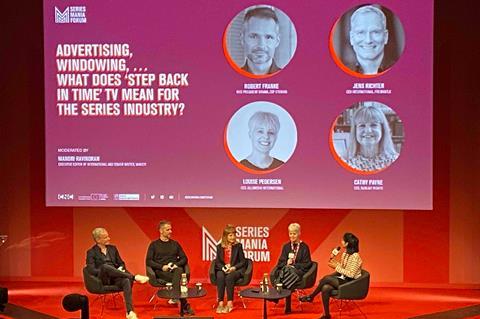
Global streamers are becoming more flexible about rights deals, according to senior execs from Banijay, All3Media, Fremantle and ZDF Studios speaking on a panel at Series Mania.
For many years, major streamers would often insist on taking worldwide rights for series. But this has changed, according to Cathy Payne, CEO of Banijay Rights.
“As [the streamers] get to know their audiences incredibly well, combining with balancing their financials, we are seeing there are certain shows they are commissioning in the unscripted and scripted space, where they’ll be looking for a licence just for a domestic territory, and the rest of the world will be available.”
Payne added: “I’ve had a few meetings this morning with a number of independent producers who are looking for distribution partners…they’re saying that some of these programmes have been commissioned, but just as a domestic territory, by one of the streamers.”
Fremantle CEO of International Jens Richter said that the dividing lines between streamers and traditional broadcasters were blurring. “For people like us, it is a lot more exciting because of the variation of business models - it’s very wide.”
He cited the example of Fremantle striking a deal with Amazon to revive Australian soap Neighbours for its free streaming platform Freevee. That would have been “impossible two years ago,” he said. He also cited the example of Disney+ being the new home of Italy’s Got Talent.
Despite a challenging economic backdrop and talk of cutbacks at many US studios and streamers, there was a sense that the scripted market remains strong.
Richter said that the production and licencing volume is “still growing overall.” In recent years, he said the industry has been used to growth rates of 20-30%. “Now the growth rate might be single digits. That makes it feel like the train is stopping, but it isn’t stopping. At this point, it is a reset.”
Writers’ strike worries
The panel also addressed the possibility of a writers’ strike in the US, and the need to be prepared. The Writers Guild of America has begun negotiations with studios over a contract set to expire on May 1 — which could lead to the first strike in nearly 15 years, a prospect that would cause significant disruption to television and film projects across the industry.
Richter said Fremantle - which spans production and distribution - had discussed internally the possibility of a strike for quite a while. “We want to be prepared.” He said that no-one sees a strike as a great opportunity. “It could harm us quite a bit on the production side as well.”
Distributors will be thinking about timing conversations about licencing shows into America in case there is a strike and there will be a need for content. “When you have shows that licence into America, now you probably think about when is the right moment to go in,” said Richter. “Do I go in now or do I wait a couple of weeks? You think about the timing, you think about which shows will you bring to whom.”
Richter added: “When you’re on the production side, you think, ‘Do I have enough scripts written at this stage? How do I prepare for the potential stop of my specific drama show that I have in production this moment?’ Because it will hit us with costs.”
All3 Media International CEO Louise Pedersen said that at the recent London Screenings it felt that a lot of American buyers were planning for it to happen. “A lot of them were saying, ‘This show possibly we can’t co-produce it. But if the strike happened, we might look at it as an acquisition. I suspect that they’re doing a bit of research behind the scenes to put their backup list together.”
The execs were speaking at a Series Mania session titled ‘Advertising, windowing,… what does ‘step back in time’ TV mean for the series industry?’

























No comments yet